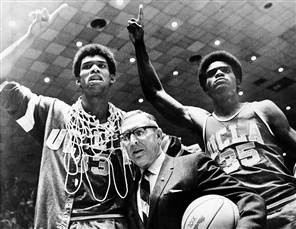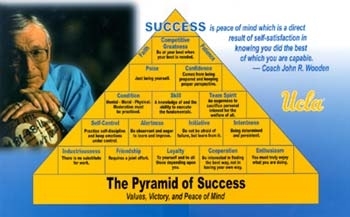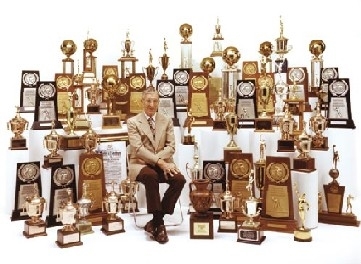 |
| John Wooden for Sports Illustrated (http://www.achievement.org/achievers/woo0/photos/woo0-077a.gif (Sports Illustrated)) |
"Try not to become a man of success, but rather try to become a man of value." (Albert Einstein). This quote describes John Wooden's philosophy and character very accurately. Former basketball coach for the UCLA Bruins, Wooden urged players to not only excel on the court, but also off the court. NCAA College Basketball Named Wooden "Coach of the Year" in 1964, 1967, 1969, 1970, 1972, and 1973 (Dana R. Barnes). Later, 1999 ESPN named him "Greatest Coach of the 20th Century" (Dana R. Barnes). Although many of the coaches at that time were only focused on winning, Wooden was not. "He just used sports as a means to teach us how to apply ourselves to any situation." (Kareem Abdul-Jabbar). John Wooden is considered the most successful college basketball coach in history; however, what made him truly successful was his integrity, his positive influence on players/ himself, and his unquenchable thirst for success.
Wooden possessed two traits that not many men had: integrity and humility; he made sure his team and himself stuck to the moral code and values that he taught and made no exceptions. In an interview in 2006, he told Marina Dundjerski, director of the UCLA History Project: "'I'm no wizard, and I don't like being thought of in that light at all,'...'"I think of a wizard as being some sort of magician or something, doing something on the sly or something, and I don't want to be thought of in that way.' He said he preferred being called simply 'coach.'...'Coach is fine,'" (Claudia Luther). Although many saw Wooden as a very complex, sophisticated man, he was really down to earth. He didn't believe in gloating or arrogance, but stayed humble and accepted a certain level of humility. When he said, "He said he preferred being called simply, coach.'", it showed how he lived by his integral values and how he expected no less from his players. He was a simple minded man that lived by simple values and the way he described himself and the way others described him were practically the same: "David Greenwald wrote in UCLA Today, a staff and faculty newsletter. 'John Wooden stands out as a stalwart man of integrity, someone who taught his players first and foremost to respect themselves, their opponents and each other.'" Greenwald describes Wooden as a "stalwart man of integrity" who didn't only teach his moral values, he lived by them. Wooden held himself and his players to a high standard, and so did other people; however, his self image or pride never got in the way of the values he taught. John Wooden really practiced what he preached; he didn't expect anything from his players that he didn't expect from himself.
 |
| (http://nbcsportsmedia2.msnbc.com/j/NBCSports/Inter ()) |
Wooden positively changed many of his players' lives by demanding respect from all his players and enforcing his policies, no matter how talented the player was. Rick Reilly, 11-time National Sportswriter of the Year, wrote: "You played for him, you played by his rules. Never score without acknowledging a teammate. One word of profanity, and you're done for the day. [Walton] showed up at practice one day with a full beard. 'It's my right,' Walton said, to which Wooden responded, 'That's good, Bill. I admire people who have strong beliefs and stick by them. I really do. We're going to miss you.' According to Reilly, Walton 'shaved it right then and there. Now Walton calls once a week to tell Coach he loves him.'" Wooden imperiously enforced his rules and didn't let talented players buy into his system. He also dispelled all dissent from all of his players by not giving any exceptions to his rules, kicking out players when they even committed the slightest infringement of his rules, ultimately making them better. Although he was known for his authoritarian style of coaching, sometimes, he found himself getting lost in the game: "Along with his strict coaching, Wooden was also known for his moral code, including no swearing or drinking. Though some of his peers derisively nicknamed him "St. John," others pointed out his habit of heckling referees and players on other teams. He once said that talking to the opposing players was what he was most ashamed of in his career." ("John Wooden"). His rules and beliefs were not only meant for his players to follow, but also himself. Too often, we see people and coaches who do not practice what they preach. And even though he gave the opposing players a hard time, he said that "was what he was most ashamed of in his career.", and regretted his action when reflecting on his career. He was a genuine kindhearted character, regretting his actions, recognizing his mistakes, and learning from them. Wooden believed that basketball was played on and off the court and a player's character was also a part of how they played and performed; therefore, he made sure he enforced he moral and ethical rules very harshly.
 |
Wooden persevered to reach greatness and his own definition of "success". Many people thought Wooden just inherited the talent of the UCLA basketball program, however: "No one expected much of the UCLA Bruins when Wooden took on the team. They were, at the time, the worst team in the Pacific Coast Conference . Wooden did not focus on winning; he focused on creating players who would be quick, who would achieve their best possible physical condition, and who would work together. In 1963, that strategy for quickness paid off, when his team, featuring no players over the height of six-feet five-inches, made the NCAA tournament undefeated and won their championship game 98-83." ("John Wooden"). This showed how it took many years and hard-work to be recognized as the UCLA basketball program as we know it to be today. Wooden's drive and committal to greatness is proven by the "first years... having average records" and then working his way up from there to produce a championship worthy team. But what Wooden really strived for was not just to create the next NBA superstar; he focused on building positive character traits within a player: "Though his teams were known for winning, he was proudest of the success his players achieved after leaving college. The majority of his players graduated, something uncommon in the modern era of basketball, in which players often leave college to start in the NBA after completing only two years of post-secondary studies. Of Wooden's players, 30 became attorneys, and others succeeded as teachers, doctors, and ministers." ("John Wooden"). Wooden's greatest success as a coach wasn't that he won 10 out of 12 NCAA championships, but that his players all were well disciplined and didn't all end up playing basketball. He felt his greatest joy knowing that he gave the players an encouraging nudge towards a world outside of basketball, and succeeded in influencing his players' lives and character. Wooden worked hard to achieve all of his goals, which weren't all basketball orientated, he taught players real life skills through basketball and helped them blossom.
 |
| (http://hoopedia.nba.com/images/4/49/Wooden_trophie ()) |
Wooden described success as: "peace of mind attained only through self-satisfaction in knowing you made the effort to do the best of which you're capable. I believe that's true. If you make the effort to do the best of which you're capable, to try and improve the situation that exists for you, I think that's success. And I don't think others can judge that. I think it's like character and reputation. Your reputation is what you are perceived to be; your character is what you really are. And I think that character is much more important than what you are perceived to be." (John Wooden). Wooden would be considered successful in his own eyes and others eyes. He lived with integrity and made sure not only to preach it, but to live by his own standards too. He commanded respect from all of his players and even in the face of dissent; he didn't waiver his values or rules, ultimately affecting his players' lives positively. Finally, he aspired for success, not the mainstream idea of success, but his own idea. He inspired not only his players, but also the general public. This was reflected through his impact on his player's; in Bill Walton's words, "I thank John Wooden every day for all his selfless gifts, his lessons, his time, his vision and especially his patience.This is why we call him coach." Wooden showed the public how life lessons could be taught through sports; but more importantly, how having good values and character can help us achieve everyday goals and even lifelong goals. A true hero must not only strive to be successful, but also retain his morals and become a man of value. .
Works Cited
"John Robert Wooden." Notable Sports Figures. Ed. Dana R. Barnes. Detroit: Gale, 2004. Gale
Biography In Context. Web. 10 Dec. 2012.
"Wooden, John Robert." World of Sports Science. Ed. K. Lee Lerner and Brenda Wilmoth
Lerner. Vol. 2 Detroit: Gale, 2007. 795-796. Gale Virtual Reference Library. Web. 6 Dec. 2012
"John Wooden." Newsmakers. Vol. 4. Detroit: Gale, 2012. Gale Student Resources In Context. Web. 8 Dec. 2012
Luther, Claudia. "Coach John Wooden, 1910-2010." Coach John Wooden, 1910â€Â�OB2010
/UCLA Newsroom. 4 June 2010. 10 Dec. 2012 .
Wooden, John. "The Difference Between Winning and Succeeding" Feb. 2001 TED.com.Speech
http://www.ted.com/talks/john_wooden_on_the_difference_between_winning_and_success.html
Page created on 1/10/2013 12:00:00 AM
Last edited 4/18/2024 5:16:14 AM
